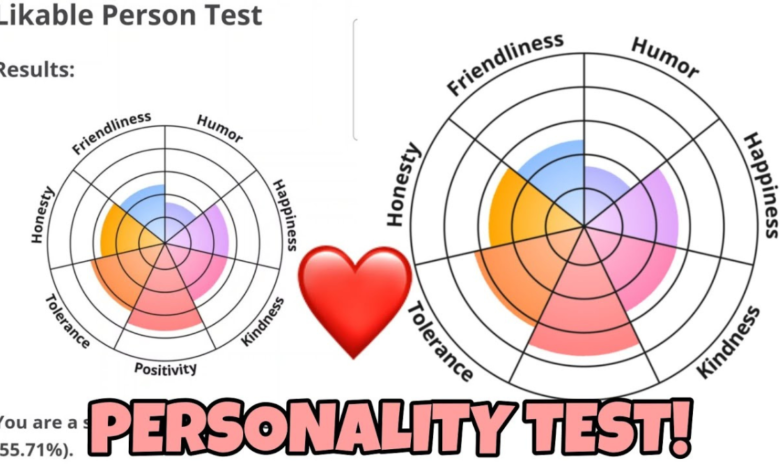The Likeable Person Test: Understanding What Makes Someone Truly Likeable

Have you ever met someone who instantly puts you at ease? They seem to have an innate likeable person test to connect with others, leaving a positive impression wherever they go. This phenomenon often leads us to wonder: what makes a person likeable? The “likeable person test” can help us unravel the qualities that contribute to a person’s likability, making it a fascinating area to explore. In this article, we’ll delve into the intricacies of being likeable, how to assess this quality in ourselves and others, and the impact it has on our personal and professional lives.
The Concept of Likability: What Does It Mean?
Defining Likability
likeable person test is more than just being friendly; it’s about creating genuine connections with others. A likeable person tends to be approachable, warm, and relatable. They often exude a certain charisma that draws people in, making interactions feel effortless and enjoyable. But what exactly contributes to this quality? Is it merely a personality trait, or can it be developed over time?
At its core, likeable person test encompasses various attributes such as empathy, authenticity, and a good sense of humor. Empathy allows individuals to understand and relate to the feelings of others, fostering deeper connections. Authenticity, on the other hand, creates trust and reassurance, letting others feel comfortable around them. Humor can lighten the mood and create shared experiences, reinforcing bonds among individuals.
Understanding likeable person test is crucial, especially in our increasingly interconnected world. It plays a significant role in personal relationships, social dynamics, and even professional success. People are naturally drawn to those who make them feel valued and understood, emphasizing the importance of developing likable qualities in our interactions.
The Science Behind Likability
Interestingly, likeable person test has been the subject of various studies, revealing fascinating insights into why certain individuals are more appealing than others. Researchers have identified specific traits that contribute to likability, including warmth, competence, and trustworthiness.
Warmth encompasses traits likeable person test kindness, friendliness, and approachability. A warm individual is often seen as supportive and non-threatening, encouraging others to engage with them. Competence, on the other hand, refers to the perception of someone’s ability to perform tasks effectively. While warmth draws people in, competence helps establish respect and admiration.
Trustworthiness is another crucial factor. People are naturally inclined to like those they believe they can trust. When individuals feel safe and assured around someone, they’re more likely to open up and form meaningful connections. Understanding these underlying principles can help us reflect on our likability and identify areas for improvement.
Likability in Different Contexts
likeable person test is not a one-size-fits-all concept; it can vary depending on the context and the relationships involved. In social settings, for example, someone might be viewed as likeable due to their ability to entertain and engage a group. However, in a professional environment, the criteria for likability might shift to include reliability and competence in one’s role.
In friendships, emotional support, and shared interests often play a significant role in establishing likeable person test. Conversely, in romantic relationships, chemistry and mutual attraction can heavily influence perceptions of likability. Understanding these nuances can help individuals navigate various social landscapes and adjust their behaviors accordingly.
As we explore the attributes of likeable person test individuals, we can begin to understand how we can cultivate these qualities within ourselves and improve our interactions with others.
The Likeable Person Test: How to Assess Your Likability
Self-Reflection: The First Step
To embark on the journey of becoming a more likeable person test, self-reflection is essential. This process involves examining your behaviors, attitudes, and interactions with others. Ask yourself questions like: Do I listen actively when others speak? Am I open to different perspectives? Do I express gratitude and appreciation for those around me?
Taking an honest inventory of your social skills can reveal areas that may need improvement. For instance, if you find that you often dominate conversations, working on being a better listener can significantly enhance your likeable person test. Alternatively, if you struggle to express appreciation, taking small steps to acknowledge others can help create a more positive dynamic in your relationships.
Journaling can be a useful tool for self-reflection. Writing down your thoughts and experiences in social situations can help you identify patterns in your behavior and highlight moments where you felt particularly connected to others. Over time, this practice can foster greater self-awareness and a deeper understanding of your likability.
Seeking Feedback from Others
While self-reflection is vital, seeking feedback from friends, family, or colleagues can provide valuable insights. People often perceive us differently than we perceive ourselves, so gathering external opinions can help paint a clearer picture of your likeable person test.
Consider asking trusted individuals specific questions about your interactions. For example, you might inquire about whether you make them feel heard, if you display empathy, or if there are areas where you could improve. This feedback can be invaluable, guiding you toward actions that can enhance your likability.
Keep in mind that receiving feedback can be challenging, especially if it’s not entirely positive. Approach the process with an open mind, recognizing that constructive criticism can be an opportunity for growth. By embracing feedback, you can develop a more nuanced understanding of how others perceive you.
Practical Exercises to Boost Likability
Once you’ve gained insights through self-reflection and feedback, it’s time to put that knowledge into action. There are several practical exercises you can undertake to enhance your likability. One effective approach is to practice active listening. This involves fully engaging with the speaker, making eye contact, and responding thoughtfully. By demonstrating genuine interest in others, you can create a more positive and connected atmosphere.
Another exercise is to cultivate gratitude. Taking time each day to express appreciation for others can foster goodwill and strengthen relationships. Whether it’s sending a quick message of thanks or verbally acknowledging someone’s efforts, these small gestures can have a significant impact on how others perceive you.
Lastly, consider stepping outside of your comfort zone. Engaging in new social activities, volunteering, or attending community events can expose you to diverse individuals and experiences. Embracing these opportunities not only broadens your horizons but also allows you to practice your likability skills in various contexts.
The Impact of Being Likeable in Personal and Professional Life
Building Meaningful Relationships
One of the most significant benefits of being a likeable person test is the ability to build meaningful relationships. Likable individuals often find it easier to connect with others, leading to deeper friendships, supportive networks, and fulfilling partnerships. When people feel comfortable and valued in your presence, they are more likely to invest in the relationship.
In personal life, likeable person test can lead to stronger bonds with family and friends. People are drawn to those who make them feel good about themselves, and likable individuals tend to uplift and inspire those around them. By nurturing these connections, you create a network of support that can enrich your life in countless ways.
Moreover, being likeable person test can have a ripple effect. When you create positive interactions, others are more likely to reciprocate, fostering a cycle of kindness and understanding. This not only enhances your relationships but also contributes to a more positive social environment overall.
Enhancing Professional Opportunities
In the professional realm, likeable person test can significantly influence career success. Colleagues and supervisors are more inclined to work with and promote individuals they find likeable. Building rapport with coworkers can lead to collaborative opportunities, networking connections, and mentorship possibilities.
In job interviews, likability plays a crucial role as well. Employers often look for candidates who not only possess the necessary skills but also fit well within the team dynamic. A likeable candidate is more likely to leave a lasting impression, increasing their chances of being hired.
Furthermore, a likeable persona can improve leadership potential. Leaders who are perceived as approachable and relatable often inspire loyalty and dedication among their teams. By fostering a culture of respect and understanding, likable leaders can enhance morale and drive productivity.
Navigating Challenges with Likability
Despite the many benefits of being likeable, challenges can arise. Situations that require tough conversations or conflict resolution can test even the most likable individuals. However, maintaining likability during these moments is possible through effective communication and empathy.
When faced with a disagreement, approach the conversation with an open mind and a willingness to listen. By acknowledging the other person’s perspective, you demonstrate respect and understanding, which can help de-escalate tension. Striking a balance between assertiveness and empathy allows you to navigate challenges while maintaining your likable persona.
Additionally, it’s important to remember that not everyone will perceive you as likeable. That’s perfectly normal! Embracing authenticity means recognizing that not every interaction will lead to a positive connection. Focus on nurturing relationships that uplift you and align with your values, rather than trying to please everyone.
Cultivating Likable Qualities: A Roadmap to Success
Embracing Empathy
Empathy is a cornerstone of likability. Developing the ability to understand and share the feelings of others can enhance your connections significantly. To cultivate empathy, practice putting yourself in someone else’s shoes. Ask yourself how they might be feeling in a given situation and respond with compassion.
Engaging in active listening is also crucial for fostering empathy. When someone shares their experiences, resist the urge to interrupt or offer solutions immediately. Instead, listen attentively and validate their emotions. This simple act can create a strong bond and make the other person feel truly understood.
Additionally, consider volunteering or participating in community service. These experiences can expose you to diverse perspectives and foster a deeper understanding of the challenges others face. By cultivating empathy, you can enhance your likability and contribute positively to the world around you.
Authentic Communication
Being genuine in your interactions is essential for likability. Authentic communication involves expressing your true thoughts and feelings, rather than conforming to what you think others want to hear. This honesty creates trust and encourages open dialogue.





